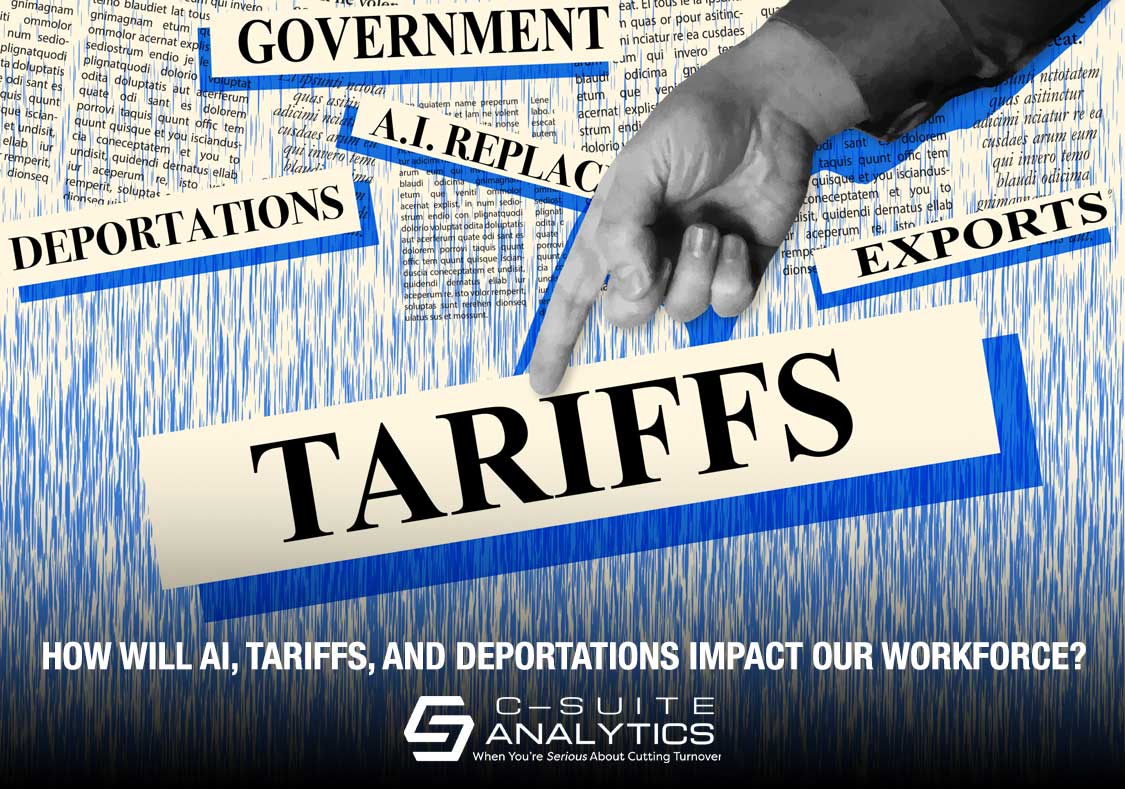AI, deportations, tariffs, and birthrate declines are reshaping America's workforce—blue- and white-collar alike. From baby boomer exits to AI disruptions, breaking down the workforce challenges no leader can afford to ignore.
Will Work From Home Create More Turnover or Less Turnover For You?

I’ve read over a hundred surveys on this subject and promise to not quote any of them because so much of the data is in conflict. Times change, moods change, and one day employees like working from home while managers don’t…and then the opposite becomes true. And while some CEOs who are all-in on work from home are ending their commercial leases, others are ordering their troops back to the office ASAP.
What I can tell you is there are more unknowns than knowns. As the British say, “There is much to sort out”. This decision is about more than any CEO’s gut feelings because good talent might leave if they don’t like your policy. And those might be your very top performers.
Permit me, though, to break my rule and share a very recent survey where an overwhelming majority of employees said they would rather take a $30,000 pay cut than return to their offices. This poll covered 3,000 employees who represented 45 large employers.[i] At first glance, one would conclude most employees are desperate to work from home…though I am always a wee bit skeptical of hypothetical survey results, the kind that imply “If you could do this, would you?” Actions, as they say, speak louder than words. And with $30,000 being a large chunk of change, you would have to conclude that some of these folks are so eager to work from home that they are willing to work from smaller homes.
If I were an executive staring at developing a policy for my company, here are things I would consider:
1. What do my employees want to do? This decision risks so much money regarding retaining and losing talent that any executive who doesn’t consider their employees’ opinions is foolish…even if those opinions are in conflict. You can’t please everyone but there is an advantage to pleasing most.
2. The rarely-noted and extreme benefit to permitting work from home is recruiting for talent moves from local to global because new hires can work from anywhere…at a time when talent is scarce.
3. Recognize that there are concrete advantages to everyone being in the same location sometimes, too. This quote from a major-company CEO nails it with a specific example: “I am concerned that we would somehow believe that we can basically take kids from college, put them in front of Zoom, and think that three years from now they’ll be every bit as productive as they would have had they had the personal interaction.”[ii]
4. Be careful that executive quotes don’t become billboard material for employees to quit or lose engagement steam. During a recent Wall Street Journal CEO Council meeting, JPMorgan Chase’s Jamie Dimon commented that remote work doesn’t work well “for those who want to hustle.” And Goldman Sachs’ David Solomon described working from home as “an aberration that we’re going to correct as soon as possible.”[iii] These are clearly my-way-or-the-highway comments that might trigger some high-performers to take the highway.
5. Realize that your company’s policy decision impacts not just current employees but also future ones…and this is one of those great unknowns because we don’t know how many thousands or millions of workers will draw a hard line for working from home forever; and this includes hotly-contested recent college grads, too.
6. Many companies are considering hybrid plans or choice plans where employees work some time in the office and some time at home. These organizations should make certain their policies are airtight to fight against the appearance of favoritism…including good reasons why those who must come to the office each day must do so.
7. Some employees who are expected to return to the office might be reluctant to do so purely for health concerns, sounding a claxon call for patience…at least for a while.
Perhaps the easiest mistake is to assume employees who work from home will feel the same glue to their managers and to your company as they did before in your workplace. Most of them won’t unless you do something different. There will be a work-from-home-relationship-gap, a subtle, intangible hole that will develop as managers replicate the same communications styles they did before that won’t work when talking through screens. Gone will be the daily banter in hallways, restrooms, and before and after meetings, what we used to call water-cooler talk. These informal chats humanized each of us because we shared family stories, work anecdotes, and our faces reflected our own joys and compassions.
Is it fair to say our leader-employee relationships risk becoming more robotic? I think so. Let’s watch the impact on engagement scores in the next 12-24 months.
This takes me back a decade ago when I invented Stay Interviews. The simplistic goal at the time was why wait until employees left to ask them how they liked their jobs when you can ask them now before they go. My mind has evolved since to where Stay Interviews are essential because they help leaders build trust…by asking/listening/probing about work from the employee’s point of view. Never, ever have Stay Interviews mattered more.
Dick Finnegan is CEO of C-Suite Analytics which consistently helps organizations cut turnover by 30% and more…and he is SHRM’s top-selling author and top-rated webcast presenter. Please email him your comments to DFinnegan@C-SuiteAnalytics.com. You are also welcome to forward this blog to anyone you believe would find it helpful.
[i] https://www.wusa9.com/article/money/30k-pay-bump-or-work-from-home-permanently-poll-asks/65-871391e4-f48b-4c75-8e12-215bf2841380
[ii] https://www.wsj.com/articles/what-ceos-really-think-about-remote-work-11600853405?mod=hp_lead_pos11
[iii] https://www.shrm.org/resourcesandtools/hr-topics/employee-relations/pages/rewarding-employees-who-leave-remote-work-behind.aspx?utm_source=marketo&utm_medium=email&utm_campaign=editorial~HR%20Week~NL_2021-6-7_HR-Week&linktext=Rewarding-New-and-Current-Employees-Who-Leave-Remote-Work-Behind&mkt_tok=ODIzLVRXUy05ODQAAAF9g61K-pczaSj-JVcx68KwMMBDd6y-vggW33GuoUgE9raQokFK28-JTGHycl7S0yVfMZ2OYW2s1jI1U6TBHKRyFztWEu_hwOxOh1hL9TsrLMnpVg



